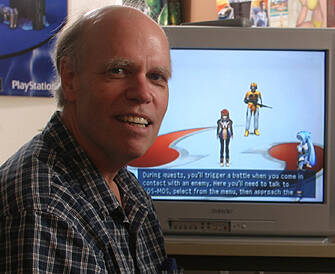
Image Source: University of South Carolina
James Paul Gee PhD
Background
Dr. James Paul Gee is most known for his founding work as a linguist and learning scientist. His work connects language, learning, and literacy to cognition, social, and cultural context. He is known for ideas such as situated learning and understanding discourse in the high-tech world. He is a Mary Lou Fulton Presidential Professor of Literacy Studies and a Regents' Professor at Arizona State University. Also, he is a member of the National Academy of Education. Dr. Gee earned his BA in Philosophy at the University of California Santa Barbara and his Masters and Ph.D. in Linguistics from Stanford. He also taught at Hampshire College, Boston University, University of Southern California, Clark University, and the University of Wisconsin.
His website highlights his important works as:
"His book Sociolinguistics and Literacies (1990, Fifth Edition 2015) was one of the founding documents in the formation of the “New Literacy Studies”, an interdisciplinary field devoted to studying language, learning, and literacy in an integrated way in the full range of their cognitive, social, and cultural contexts. His book An Introduction to Discourse Analysis (1999, Fourth Edition 2014) brings together his work on a methodology for studying communication in its cultural settings, an approach that has been widely influential over the last three decades. Professor Gee’s book What Video Games Have to Teach Us About Learning and Literacy (2003, Second Edition 2007) argues that good video games are designed to enhance learning through effective learning principles supported by research in the Learning Sciences. Situated Language and Learning (2004) places video games within an overall theory of learning and literacy and shows how they can help us in thinking about the reform of schools. Women as Gamers: The Sims and 21st-Century Learning (2010) and Language and Learning in the Digital Age (2011), both written with Elisabeth Hayes, have continued his earlier work on games and learning. His most recent books are The Anti-Education Era: Creating Smarter Students through Digital Learning (2013); Unified Discourse Analysis: Language, Reality, Virtual Worlds, and Video Games (2014); Literacy and Education (2014); The Essential James Gee: An Introduction to Discourse Analysis (2015); and Teaching, Learning, Literacy in Our High-Risk High-Tech World: A Framework for Becoming Human (2017), and Introducing Discourse: From Grammar to Society (2017)."
Paving the Way to Understanding Learning Theory
Dr. Gee's ideas in the matter of video game theory are key to understanding how the digital world understands language. Particularly the way context plays a role in how we understand material and remember it. Additionally, the multimodality of a video game offers content guided by audio, visual, reading, writing, and problem-solving in an effort to fully engage the brain. Video games understand the idea of teaching better than some classrooms, offering a fail-safe method of practicing. Teaching in safe mode or returning to where you last started offers students a way to try in real-time what they know or understand. The idea that video games contain a key attribute to learning helps us see why they are so popular and addicting when they reward the user for success. Instead of teaching in the way of regurgitating for a test, teaching to reach another level shows the student that he/she understands the information and moves on. No test is required when an actionable response is shown. There is less test stress and no memorization. The student is using the knowledge he/she has learned by playing in the game.
Additionally, Dr. Gee shows how situated learning offers a glimpse into the importance of social engagement. His work notices the added effectiveness of connected cultures and differences. Language is a changing subject, so effective language must bridge cultures and offer multiple ways to convey messages. Language cannot be just about the words written it must be about how it is interpreted and the discourse that follows. If it was only about the words, then books would be enough to make society equitable. But it isn't, there is still a huge gap in education, the reason is in the engagement of the content.
I want you to take a look at Dr. Gee's "10 Truths about Books: What they have to do with Video Games (2011-05-15)" he mentions in an archived blog and in his book Situated Language and Learning (2004). Click Here for the PDF (acedemic.jamespaulgee.com)
Think of situational context as a way that the human brain interprets information. It is always going to be different, no matter what. Why? Because every human is having a different experience, thinks differently, learns differently, and understands the book or content differently. The idea that one culture could interpret materials superior to another is absurd, since there isn't a write or wrong way, just a different way. The experience is situational and the culture creates that situation. That's a core idea for creating equity in education. Dr. Gee explains that the digital world is inclusive and creates ways to find situational equity by bringing cultures together, merging understanding content, and celebrating the differences we all see. His ideas on situativity theory helped learning science understand why the system feels broken, inequitable, and disjointed. We know understand that the digital world offers more than just faster speed, unlimited data, and at-will knowledge. It offers a social bridge to understanding context and enables new ideas to flow easily and across languages. Language is the ultimate tool but writing with context in a situated social structure offers learning.
Arizona State University Center for Games and Impact
CLICK HERE TO GO SEE THE AMAZING GAMES TRANSFORMING LEARNING
Create Your Own Website With Webador